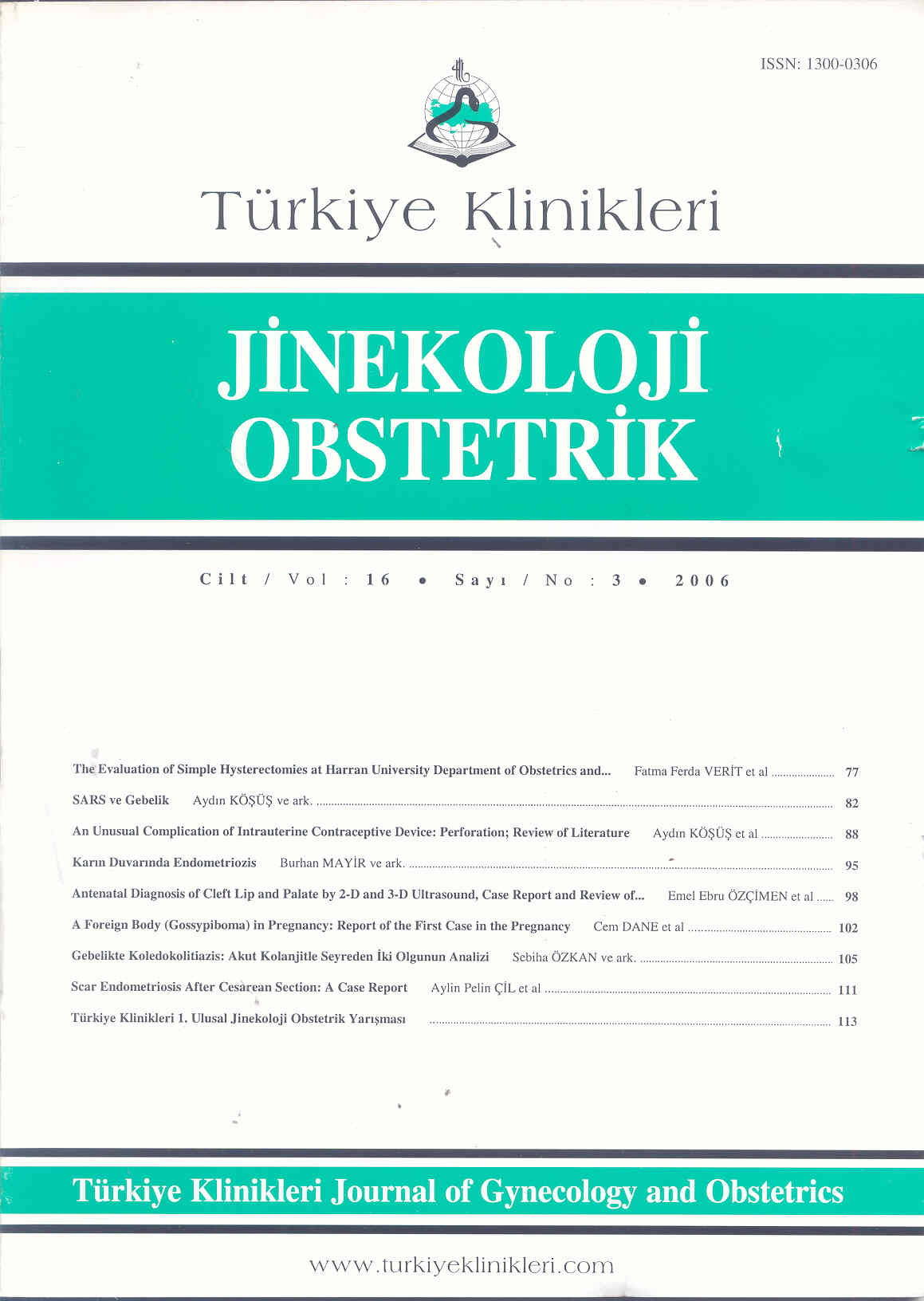Open Access
Peer Reviewed
REVIEW
3522 Viewed1323 Downloaded
Sars And Pregnancy
SARS ve Gebelik
Turkiye Klinikleri J Gynecol Obst. 2006;16(3):82-7
Article Language: TR
Copyright Ⓒ 2025 by Türkiye Klinikleri. This is an open access article under the CC BY-NC-ND license (http://creativecommons.org/licenses/by-nc-nd/4.0/)
ÖZET
SARS (Severe Acute Respiratory Syndrome) bir çeşit koronavirüsün (SARS-CoV) neden olduğu, hayatı tehdit eden atipik pnömoni şeklidir. Mortalite %3 ile %15 arasında değişmekle birlikte etkilenen yaş grubuna göre %50'ye kadar çıkabilmektedir. Virüs izolasyonu ve antikor taraması ile teşhisi konabilir. Ancak klinik ve epidemiyolojik bulgularla teşhis desteklenmelidir. Tedavide en sık kullanılan ajanlar kortikosteroidler ve ribavirindir. Annenin ve bebeğin durumu, enfeksiyonun şiddeti ve gebelik haftasına göre takip yada doğum kararı verilebilir. Fakat bu karar hasta tüm yönleriyle değerlendirildikten sonra kadın doğum, pediatri ve anestezi uzmanından oluşan bir ekip tarafından verilmelidir. Annenin sağlığı öncelikli olduğundan verilecek tedavi, daha iyi bir alternatifi bulunmadıkça kesin olmayan fetal risklerden dolayı ertelenmemelidir.
SARS (Severe Acute Respiratory Syndrome) bir çeşit koronavirüsün (SARS-CoV) neden olduğu, hayatı tehdit eden atipik pnömoni şeklidir. Mortalite %3 ile %15 arasında değişmekle birlikte etkilenen yaş grubuna göre %50'ye kadar çıkabilmektedir. Virüs izolasyonu ve antikor taraması ile teşhisi konabilir. Ancak klinik ve epidemiyolojik bulgularla teşhis desteklenmelidir. Tedavide en sık kullanılan ajanlar kortikosteroidler ve ribavirindir. Annenin ve bebeğin durumu, enfeksiyonun şiddeti ve gebelik haftasına göre takip yada doğum kararı verilebilir. Fakat bu karar hasta tüm yönleriyle değerlendirildikten sonra kadın doğum, pediatri ve anestezi uzmanından oluşan bir ekip tarafından verilmelidir. Annenin sağlığı öncelikli olduğundan verilecek tedavi, daha iyi bir alternatifi bulunmadıkça kesin olmayan fetal risklerden dolayı ertelenmemelidir.
ANAHTAR KELİMELER: SARS virus; gebelik
ABSTRACT
Severe acute respiratory syndrome (SARS) is a potentially life-threatening, atypical pneumonia that results from infection with SARS-associated coronavirus (SARS-CoV). Mortality is between 3-15%, may well be as high as 50% depending on the age group affected. Diagnosis of SARS remains based on clinical and epidemiological findings. Virus isolation and antibody detection are also useful for strict diagnosis. Most frequent agents used in treatment are corticosteroids and ribavirin. The management of pregnant women with SARS will depend on the maternal condition, the gestational age, the fetal well-being, severity of infection and the maternal wish. A multidisciplinary approach involving obstetricians, neonatologists and anesthesiologists is very important. The primary concern should be the mother's safety and hence, any treatment considered to be useful should not be withheld because of uncertain fetal risk unless an alternative is available.
Severe acute respiratory syndrome (SARS) is a potentially life-threatening, atypical pneumonia that results from infection with SARS-associated coronavirus (SARS-CoV). Mortality is between 3-15%, may well be as high as 50% depending on the age group affected. Diagnosis of SARS remains based on clinical and epidemiological findings. Virus isolation and antibody detection are also useful for strict diagnosis. Most frequent agents used in treatment are corticosteroids and ribavirin. The management of pregnant women with SARS will depend on the maternal condition, the gestational age, the fetal well-being, severity of infection and the maternal wish. A multidisciplinary approach involving obstetricians, neonatologists and anesthesiologists is very important. The primary concern should be the mother's safety and hence, any treatment considered to be useful should not be withheld because of uncertain fetal risk unless an alternative is available.
MENU
POPULAR ARTICLES
MOST DOWNLOADED ARTICLES





This journal is licensed under a Creative Commons Attribution-NonCommercial-NoDerivatives 4.0 International License.










